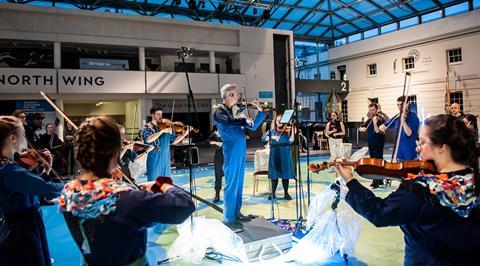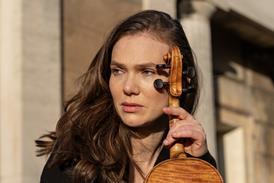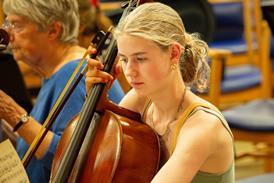Working with students from Trinity Laban, Nic Pendlebury examines how music is used to comment on climate change in a project juxtaposing Vivaldi’s Four Seasons with Hollie Harding’s Melting, Shifting, Liquid World

The Shipley Arts Festival and Founder, Andrew Bernardi, are delighted to be inviting one of its long-standing members, Nic Pendlebury, to open the Festival with his devised piece A Change of Season for Trinity Laban’s String Ensemble. The Festival is committed to providing a platform for young players to develop, and to drawing awareness towards the environment, and as such is thrilled to host A Change of Season with an additional appearance from the Bernardi Music Group’s String Academy.
A piece by Nic Pendlebury, head of the string department at Trinity Laban Conservatoire of Music and Dance and violist of the Bernardi Music Group.
Climate change is one of the most disturbing and immediate issues of our time. I am old enough to remember snow at Christmas and blistering hot summers, but now, as we all know, it is almost impossible to predict the weather.
I curated A Change of Season as a way to engage with this political issue through the arts. Inaction is no longer an option, so I wanted to inspire my students to use their creative artforms as a tool for change and show that art can carry strong messages into everyday consciousness.
Read: Session Report: Classical crusader
Read: ‘Nature is in charge here’ - A festival among the moors
Through the juxtaposition of Vivaldi’s iconic masterpiece and an immersive sound world from living composer and Trinity Laban lecturer Hollie Harding, the programme explores the seasons as they should be and as they may become, using performance as a way to comment on and respond to the climate emergency and engage with audiences.
The inspiration for the programme has its origins in a world premiere from 2019, when Hollie was completing her PhD in composition with us. As a composer she is interested in looking at different ways of constructing performance scenarios and exploring the impact this has on compositional processes and the listening experience. Excited by her approach, I invited her to collaborate with me to develop a work for electric viola and the conservatoire’s string ensemble.
The resulting work Melting, Shifting, Liquid World embodies the kind of creative, collaborative and innovative work that sets us apart as London’s creative conservatoire.
Blending innovative audio technology, promenading musicians and field recordings of Arctic sea ice, it forefronts the consequence of rising temperatures and ocean pollution. It is the first composition to incorporate the use of open-ear, bone-conduction headsets alongside live acoustic and amplified instruments to create a multi-layered sonic environment for the audience to move around and within.
We gave the world premiere on the Great Map at the National Maritime Museum in Greenwich, to critical and public acclaim, and were set to revive the piece in 2020 but the pandemic meant this was delayed. This gave time to reflect on other works inspired by the climate which is when the idea of staging a reworking of Vivaldi’s The Four Seasons together with Hollie’s piece came to mind.
Inaction is no longer an option, so I wanted to inspire my students to use their creative artforms as a tool for change and show that art can carry strong messages into everyday consciousness
Music has an incredible capacity to capture emotion and character. From the bird song of Spring to the cracking ice of Winter, Vivaldi evokes the extraordinary sounds of the changing seasons, turning sonnet lines into musical notation. In a similar way, Hollie translates poetry into sound, evoking the frozen tundra through an array of extended techniques. These are combined with field recordings from the arctic made by David Attenborough’s sound recordist Chris Watson, and the poem Still Life with Sea Pinks and High Tide by Maura Dooley.
I thought the idea of the two works in the same programme had a strong political message and could highlight a key issue from an original perspective.
It was also important for me to say something new, to offer a fresh interpretation of Vivaldi’s much-loved and much-performed suite.
To bring the Seasons to life I imagined presenting the work almost like an opera, the musical lines so descriptive and visual that I had very clear and tangible visual ideas of a set and direction in my head. However, I am not a theatre director, so to help me realise my vision we engaged theatre director Anna Morrissey and designer Carla Goodman to give this wonderful programmatic music an amazing visual element. We’ve combined music, sound and movement to bring Vivaldi’s score to life as never before.
It seems fitting to present the double bill at Shipley Arts Festival, an organisation with a strong focus on climate change, rewilding and sustainability. Works with an eco-political message are at the heart of the Founder Andrew Bernadi’s programming, including Helen Ottaway’s White Stalks commissioned to celebrate the reintroduction of nesting stalks at Knepp Castle.
It’s been a lot of hard work putting it all together but I think the resulting show will take audiences breath away and hopefully send them home with a strong message that if we are not careful this beautiful world of ours with its glorious variety of seasons will be destroyed for ever. Vivaldi’s glorious world will become more like the Harding, a prospect I suggest none of us want.
A Change of Season will open the Shipley Arts Festival at West Sussex’s Malden Family Theatre on Saturday 26 March at 6pm, with a repeat performance at 8pm. The Bernardi Music Group’s String Academy will complement the Ensemble’s focus on the seasons with works dedicated to the beauty of nature: John Ireland’s ‘Toccata’ from Concertino Pastorale and Malcolm Singer’s new work, ‘Eli Eli’. Further information here.
Bone conduction headphones kindly supplied by Shokz.
A Change of Season tour dates also include National Maritime Museum, Royal Museums Greenwich (19 and 20 March); The Stoller Hall, Manchester (23 March) and Latitude Festival (21-24 July).










































No comments yet